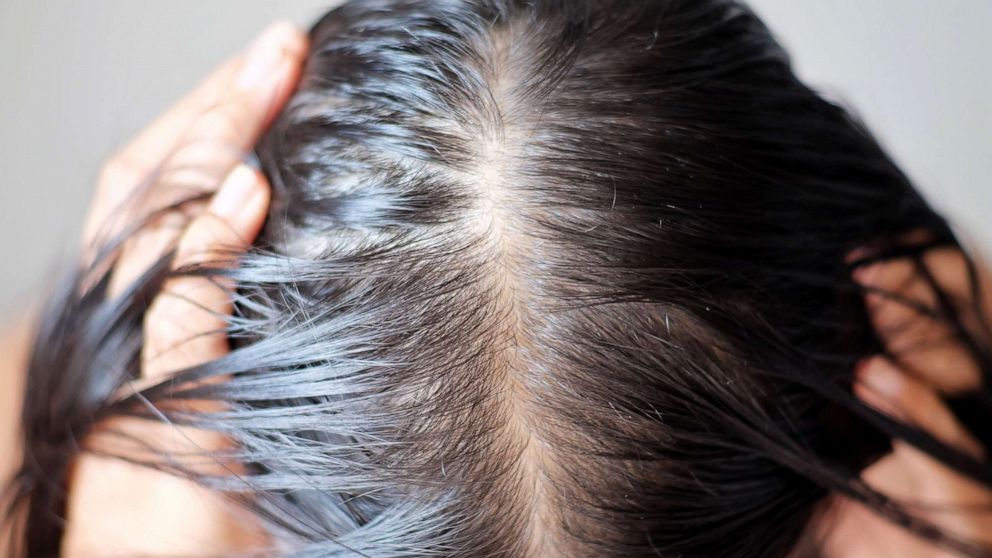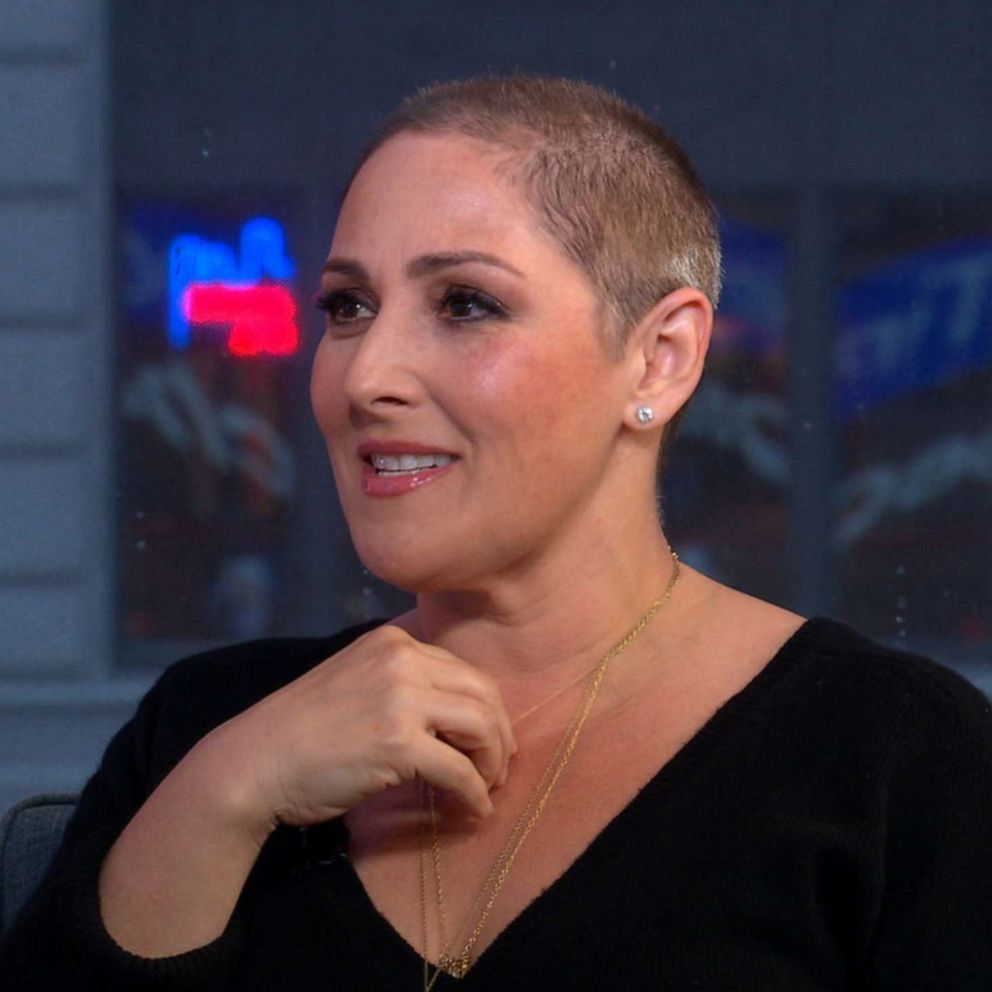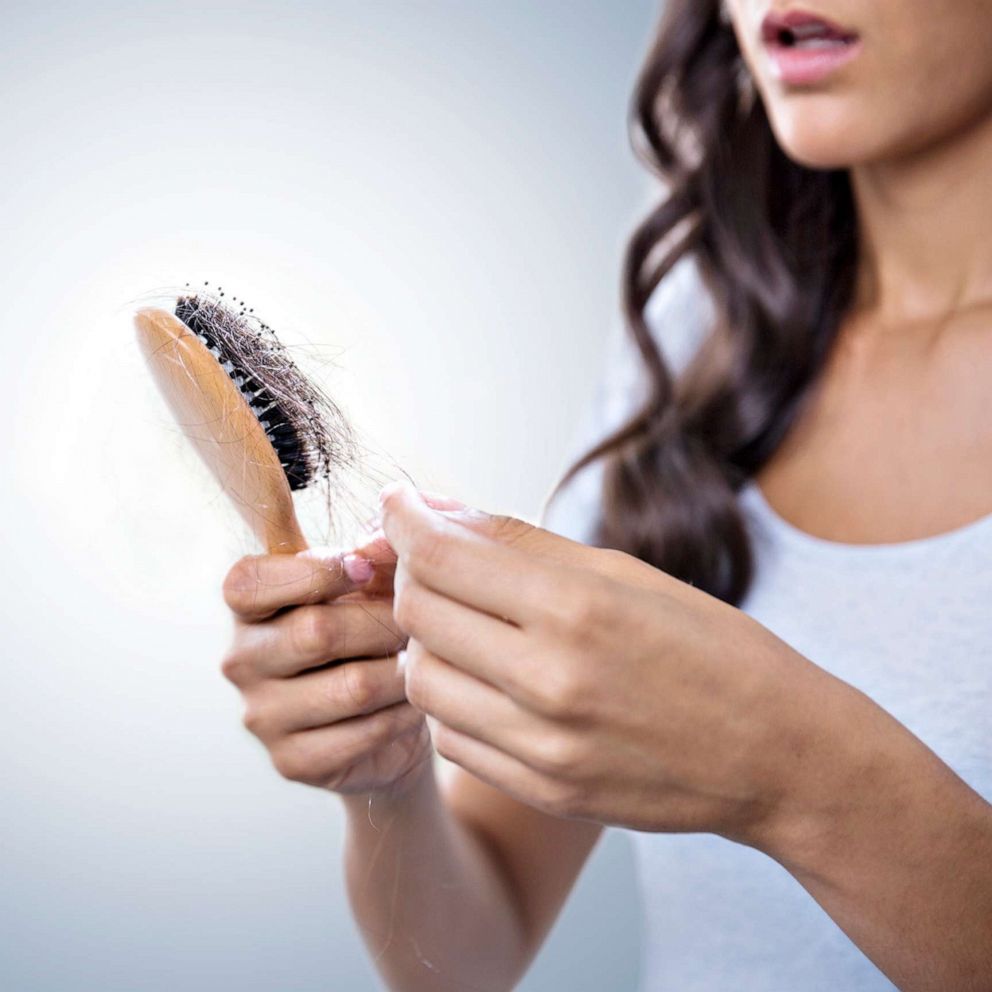12 signs of hair loss to bring up to your dermatologist
August is Hair Loss Awareness Month. Studies have estimated that gradual hair thinning in women, called female pattern hair loss, affects nearly 20% of women.
"Hair loss is a medical issue like any other symptom," Dr. Maria Colavincenzo, a dermatologist who specializes in hair disorders at Northwestern University Feinberg School of Medicine in Chicago, told "Good Morning America." "Hair health is often a reflection of health inside the body."
The goal of hair loss treatment in many cases is delaying or preventing the progression of further loss, so awareness and catching it early is key.
From changes to your overall health, to specific changes in your scalp, hair loss can start off in a variety of ways. Here are 12 symptoms and health signs in your body to be aware of that could lead to hair loss and what doctors say you can do about it.
1. You feel a small round smooth patch hiding in your scalp
"People get quite frightened when they see or feel a well-demarcated round hairless patch on their scalp," explained Dr. Amy McMichael, the chair of dermatology at Wake Forest University, who specializes in hair disorders.
Small hairless areas typically signify alopecia areata, an autoimmune disease. McMichael encourages people with this condition to go to a dermatologist as soon as possible because "The reason why we want you to be evaluated by a dermatologist is because we have some really great treatments, even when the disease is really patchy."
2. You started a strict new diet
"We do see diffuse shedding all over the scalp when folks are doing very strict dieting or they have cut out one large food group, or have lost a significant amount of weight," McMichael said.
This is a phenomenon called telogen effluvium, a reversible form of hair loss, which occurs when a greater proportion of your hairs transition to the normal shedding phase, typically three to four months after a big change in your overall health. Women often see large clumps of shedding hair in the shower or on the pillow.
Diets that cut out meat completely without proper supplementation through other foods may lead to iron deficiency, which also contributes to hair shedding.
3. You're anemic
"Young women who are menstruating will have a degree of anemia that may affect their iron levels. If we treat the underlying issue, the hair loss will improve," McMichael said, adding that "we may check labs like a blood count and an iron panel as a screening test for people with a history of anemia experiencing ongoing hair shedding."
"Other symptoms you might have if you're anemic include feeling fatigued, shortness of breath," Colavincenzo said.
4. Your thyroid is out of whack
Thyroid issues, either overactive or under-active, can lead to diffuse shedding of the hair if it's not corrected. "Dermatologists may screen the thyroid function with a blood test to see if that is the culprit," said McMichael.
In addition to hair shedding, "fatigue, weight changes, mood changes are also associated with thyroid disorders" explained Colavincenzo, so undiagnosed patients may want to highlight these symptoms while visiting their primary care doctor.
5. Your forehead is appearing larger
Receding of the frontal hairline with "increased blood vessels in the forehead or changes in the skin where it appears very light or tight, occurs in frontal fibrosing alopecia, a form of inflammatory hair loss, which means the body's immune system attacks the hair follicles and tries to kill them off," McMichael said. There are treatments available to address the inflammation available by prescription. "When we leave it untreated, we do see progression and it can be quite severe," she added.
6. Your eyebrows are vanishing
The hairs on the eyebrows can signal what's going on in the scalp. Eyebrow loss is seen in inflammatory causes of hair loss such as alopecia areata and frontal fibrosing alopecia, which are both inflammatory forms of hair loss that are managed by dermatologists.
Loss of the eyebrows from arch to tips can be seen in patients with thyroid disease. While "sometimes gradual eyebrow thinning can be associated with aging," Colavincenzo added, "if it's abrupt, it's more remarkable" and worth bringing to the attention of your doctor.
7. You've been wearing super tight braids
"If you start to notice slow loss of hair around the temples and frontal hairline that might suggest that you have traction alopecia," McMichael explained.
This may happen with very tight braids or a hairstyle that puts a lot of tension on the frontal hairline.
"We don't know for sure, but we think that some people are more at risk for this than others, and we see it much more often in people of African descent, but we also see it in ballet dancers" of any race, McMichael said, adding, "over time your hair follicles give up and if not caught early, it can be progressive and permanent."
"Still, there are many who can wear tight braids for decades and not have any hair loss," Colavincenzo said. "It's more that some people's hair can't handle that tension."
8. Your scalp is on fire
Scalp irritation is most often a sign of underlying inflammation of the scalp, which can lead to hair loss.
"Thick scaling, red irritated lesions on the scalp are easily diagnosed by a dermatologist and most often they are a form of psoriasis," said McMichael.
"Especially if you have other skin with similar rashes, sores in the mouth, and nail changes this increases the likelihood of an inflammatory form of hair loss" like psoriasis or lichen planus, explained Colavincenzo.
9. You just had a baby, surgery, or illness
Telogen effluvium is very common and women may see clumps of hair falling out three to four months after a physically taxing event like childbirth and more.
"The hair loss cycle is about three to four months so whatever started three to four months ago is going to be the culprit," explained McMichael.
This form of hair loss can be difficult for patients, said Colavincenzo, though "as dramatic as it is, it never leads to permanent hair loss."
"The delay of the onset of shedding from the inciting event and the slow nature of improvement, often on the order of months, can be frustrating," she added.
Colavincenzo added an important caveat: "A lot of the medications are commonly blamed for causing hair loss, it's unclear to what extent they actually do because many of the conditions that they're treating can also cause hair loss, such as having a blood clot or a heart attack." If a medication is causing hair loss, it's typically a temporary side effect that goes away when the medication is stopped.
10. The crown of your scalp is thinning
Central centrifugal cicatricial alopecia is another form of inflammatory and scarring forms of hair loss that preferentially affects the crown of the scalp in Black women.
"It's very slow at first, but may continue to progress," McMichael said. "It may itch or be tender or painful, or it may not."
Treatments can address the inflammation, improve symptoms and slow the process of hair loss.
11. Your center part is looking more prominent
"You might notice an increased part width over time, and see a little more of your scalp in your part," McMichael explained. This is female pattern hair loss, which is "a very common form of non-scarring hair loss due to a slow progression of miniaturization of hairs on the top of the scalp."
Women may also see finer hairs, decreased density or a thinner ponytail.
"We have absolutely wonderful treatments for [female pattern hair loss] to slow this process," she added and encouraged women to be proactive about getting an evaluation by a dermatologist.
12. You've been so stressed that your overall health is affected
"It's really about physiologic stress, so not the stress that you had at work, or breaking up with a boyfriend, but major stressors - things that affect your overall well-being," McMichael explained, adding "if you do have a big emotional stressor and you're not eating and not sleeping, that could be a factor ."
Ultimately, the stress has to affect more than just your emotions to affect your hair. "Physical and emotional stress are often connected," Colavincenzo said.
Molly Stout, M.D. a dermatology resident at Northwestern in Chicago, is a contributor for the ABC News Medical Unit.







